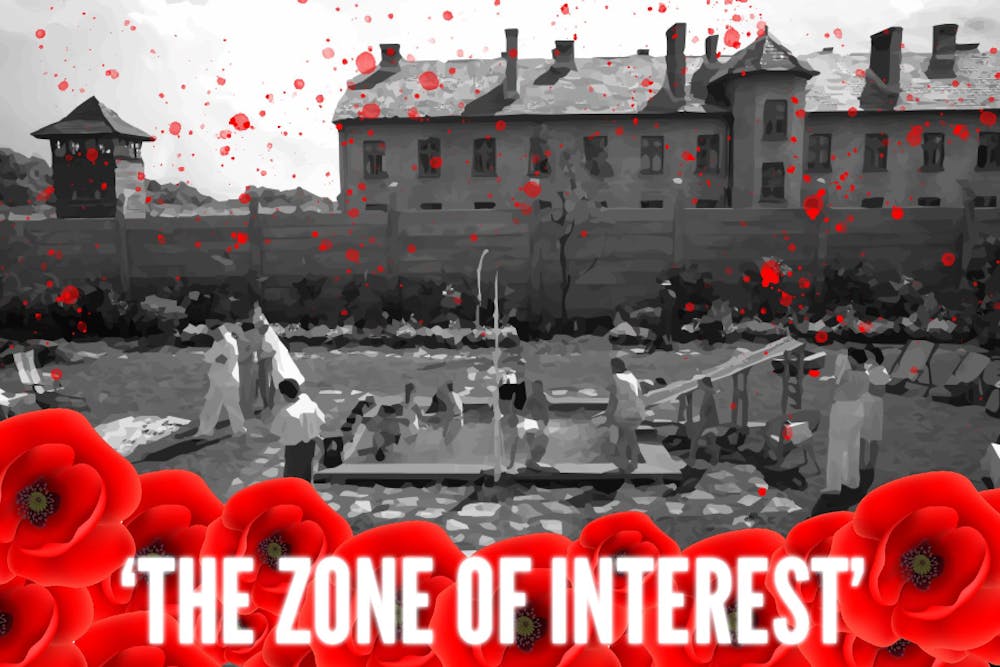How do you depict evil? How do you depict genocide? How do you depict the Holocaust? These questions have challenged filmmakers and critics for decades. Some say we must directly showcase the graphic brutality of atrocities like the Holocaust to properly inform audiences and communicate just how awful these real events were. Steven Spielberg opted for this approach with his masterpiece “Schindler’s List.” However, some would argue the medium is inherently voyeuristic, so by showing the graphic horrors of the Holocaust, you exploit Jews’ suffering for entertainment, regardless of your intentions. Jonathan Glazer’s “The Zone of Interest” has emerged as a convincing proponent of the latter school of thought. Without even showing the inside of Auschwitz, “The Zone of Interest” profoundly illustrates the detached evil that enabled the Holocaust by examining the Nazi officials and their families who executed and benefited from the genocide of Jews.
“The Zone of Interest” focuses on the commandant of Auschwitz, Rudolph Höss, and his family trying to live a normal life in their house right next to the concentration camp. Their lives are spent in the background of the death machine killing hundreds of thousands: their garden and the concentration camp share the same wall. Yet we are never shown what’s happening inside Auschwitz, and there’s barely a plot to speak of. Most of the film is made of powerful, haunting vignettes of a domestic life permeated by unfathomable evil. Through the film’s restraint and limited perspective, Glazer starkly demonstrates the cognitive dissonance of the Germans complicit in the Holocaust. The extermination of an entire people is made a mundane, daily ordeal for the Hoss family. The film’s unrelenting commitment to showing just how intense their normalization of the Holocaust is makes for a brilliantly disquieting experience that equally transfixes as it disgusts.
Despite never explicitly showing the inside of Auschwitz, “The Zone of Interest” constantly reminds the audience of the atrocities being committed. Almost every scene is accompanied by haunting background noises of people screaming in agony, guns firing and gates opening and shutting. The film’s menacing soundscape is incredibly effective at creating tension and discomfort. The film’s shots also brilliantly juxtapose the idyllic domestic life with the concentration camp looming in the background. The family has a pool party surrounded by barbed wire; Rudolph has an evening cigarette under the same sky painted by smoke from trains delivering more Jews to be indiscriminately slaughtered. And at night, the bedrooms are illuminated red by the flames of the Crematoria.
Everyone in the family tries to ignore and normalize what’s happening in their backyard, but there are moments when their evil is made explicit. Hedwig, Rudolph’s wife, boasts about the fancy items, such as fur coats, she receives from pillaged Jewish households. Hedwig’s mother celebrates how her Jewish boss might now be dying next door. But sometimes, the evil they benefit from comes back to haunt them, despite their attempts to turn their back on it. While swimming in a nearby lake with his children, Rudolf trips on bones and becomes covered in ash, making him realize he and his kids are swimming in the remains of cremated Jews.
Jonathan Glazer has masterful, precise control over the medium. Every composition is exhaustingly powerful. Glazer’s direction is characterized by austerity: static shots, wide angles and long takes are used throughout. I now totally understand the comparisons people make between him and Stanley Kubrick; their directorial styles are strikingly similar. There is a dread that permeates every shot and never relents as Glazer creates an uncomfortably intimate experience. Through his directing, he makes the audience feel like intruders in a life shocking beyond reason.
I would be remiss not to mention the score because while it is scarcely used, it is one of the best scores I have ever heard in a film. The film’s opening is around five minutes of pitch-black only, accompanied by the oppressive score, sounding like a monster roaring from the deepest pits of hell. The score briefly pops up in other moments throughout the film, representing the evil that’s so casually minimized by the Germans threatening to break loose.
“The Zone of Interest” is a masterpiece. It’s one of the most terrifying, bold and brilliant films I’ve ever seen. Glazer has pushed the medium to powerful heights by harnessing the power of what’s unseen and bluntly exposing the indifference that enables evil. Furthermore, despite being a period piece about the Holocaust, the film has incredible urgency in our modern times. When you see people being killed, exploited and oppressed, how will you react? Will you speak up? Or will you bury your head in the sand, build literal and figurative walls, continue gardening, throw pool parties and try on fur coats like nothing is happening?










